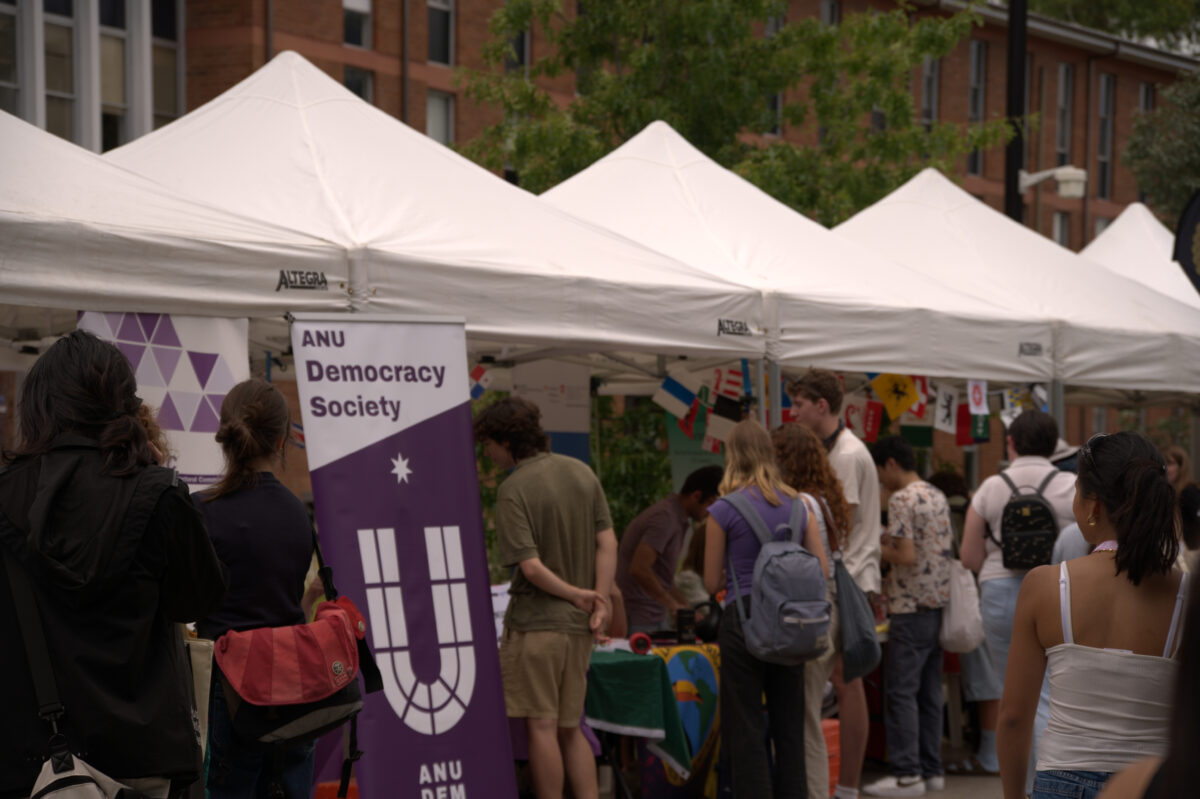On Thursday 14 March, the ANU Democracy Society (DemSoc) held a Special General Meeting (SGM) to elect a new executive and amend its constitution. The meeting took place against the backdrop of a controversial 2024 that was marked by protests against invited speakers, chaos over proxy voting and stacking, and ultimately the threat of disaffiliation by ANUSA. Whilst the new executive and a refined constitution indicate hope for the society’s future, the club is now run by an aligned “ticket” of “friends”, raising questions about its nonpartisan nature, and to what extent it can distance itself from its past problems.
The ANU Democracy Society is a self-described non-partisan political club for the discussion of political and philosophical theory and practice. Its new executive includes President Ansh Panicker, Vice President Jack Paterson, Treasurer Anthony Vassiliadis, First-year representative Nic Henchliffe, and general representatives Sagnayo Mukherjee and Dev Shah. These representatives won overwhelmingly in their elections, with the President, VP, and Treasurer winning 46-47 votes, compared to their opponents’ 18-19. The elected members all shared similar messages regarding free speech and the importance of policy debates in the upcoming Federal Election, such as discussions around nuclear energy. They were all dressed in suits, alongside other supporting members who excitedly cheered them on in their candidacy speeches.
The nature of this suited collaboration was of particular interest to the remaining members of the society, especially to the incumbent leadership. In his re-election speech, outgoing President Justin Cementon made a comment about ANU Young Liberals stacking the vote, with the society gaining approximately 40 new members in the weeks leading up to the SGM, and many signing up after an initial wave of O-week joiners. According to Cementon, over 30 members joined the Society in Week 3, seemingly unrelated to the club’s O-week membership campaign.
This sudden increase in membership coincided with the exercise of 42 registered proxy votes in the meeting (absentee votes taken up by members present), despite a new cap of three per person. DemSoc’s last AGM was also thrown into chaos, in part due to proxy voting issues. which was the catalyst for ANUSA’s intervention and threat of disaffiliation. The 42 proxy votes at March’s meeting outweighed the 20-30 people actually present.
Previous general representative Matthew Lillywhite (the only previous incumbent not running for re-election) reiterated to Woroni that, throughout his time at the Democracy Society, topics of discussion had taken a notable shift from a more general policy focus, to a more critical perspective of specific Federal Labor Government policy. Lillywhite stated, “I am not convinced DemSoc will be a bastion of free speech so much as a bastion for Liberal Party speech.”
There have been past examples of extreme positions platformed by the Democracy Society in its promotion of ‘free speech’ which have caused controversy. The Society has previously faced protests outside its panel locations for inviting speakers such as Mark Spencer, the Director of Public Policy for the Christian Schools of Australia (CSA) and a notable critic of efforts to ban conversion therapy in the ACT and Victoria, and Andrew Fraser, a retired academic and supporter of the White Australia Policy. Following backlash at Fraser’s invitation, the event he was invited to was cancelled, but protests went ahead regardless.
The new executive outwardly denied any political affiliation, yet did so in relatively roundabout ways.
Anthony Vassiliadis, Treasurer, insisted to Woroni that another member of Democracy Society was not part of their “ticket”. When challenged on whether this specific ticket was politically affiliated, Vassiliadis insisted that the new executives were just “aligned”, and finally, that they were just “friends”. President Ansh Panicker, when asked about the same terminology, similarly dismissed any form of ticket, and maintained they were all friends.
When asked for comment, both Justin Cementon and Matthew Lillywhite stated their belief that the society had been subject to a concerted takeover attempt by the Young Liberals, or at least a related group. Their
evidence relied on the extent of new membership to the club, the behaviour of incumbent Vice-President Jack Paterson and his seemingly Liberal alignment (who Cementon believes organised this alleged stack), and the comfort in which the new executive, all speaking on similar issues such as ‘free speech’, were elected, despite having had very little prior involvement in the Club. President Ansh Panicker for example, had only been a member of the society since the start of the year.
Woroni reached out to Panicker for comment, but did not receive a response.
Following a relatively chaotic SGM, the ANU Democracy Society’s longevity as a nonpartisan forum for policy debate remains in question, as some members seemed disappointed, but not surprised at the effectiveness of a single friend group’s takeover of the society. This takeover may threaten to “squander” the opportunity for ANU to have, as Cementon put it, “… a society to fill a hole generated by StuPol partisanship…”, with disaffiliation remaining a significant issue for the new executive, no matter the direction they take the club.
We acknowledge the Ngunnawal and Ngambri people, who are the Traditional Custodians of the land on which Woroni, Woroni Radio and Woroni TV are created, edited, published, printed and distributed. We pay our respects to Elders past and present. We acknowledge that the name Woroni was taken from the Wadi Wadi Nation without permission, and we are striving to do better for future reconciliation.
